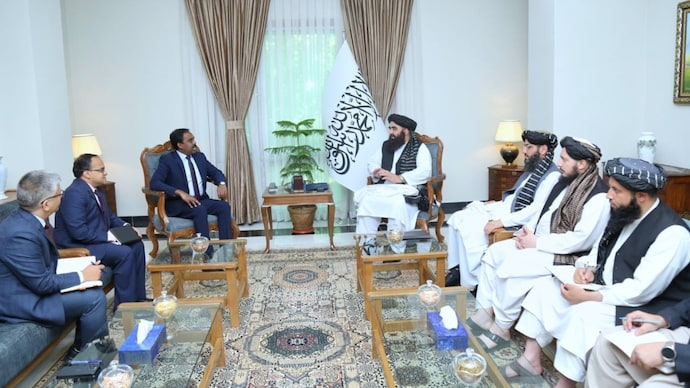Afghanistan Caught in the Crossfire of India-Pakistan Tensions; What Does Prakash’s Sudden Visit to Kabul Mean?
Following the deadly Pahalgam attack in Kashmir and the escalating tensions between Delhi and Islamabad, Anand Prakash, India’s Special Representative and Head of the Afghanistan, Iran, and Pakistan Division at the Ministry of External Affairs, made an unexpected visit to Kabul and held talks with Amir Khan Muttaqi, the acting Foreign Minister of the Taliban government. Although neither side has disclosed details of the discussions, it appears that the visit aimed to manage the regional fallout of the recent tensions between the two nuclear-armed South Asian powers. This article examines the potential objectives of the visit in the context of ongoing regional developments.

Seeking Assurances from Kabul
India claims that the perpetrators of the Pahalgam attack were supported by Pakistan, and thus reserves the right to a military response. A similar situation unfolded in 2019 following the Pulwama attack, when India conducted airstrikes on militant positions inside Pakistan in retaliation for a terrorist attack. The possibility of a similar response now looms large.
In this context, Delhi is concerned that the Taliban government might adopt an anti-India stance or, directly or indirectly, fuel a wave of Islamist support against India. The Taliban leadership’s position could significantly influence the mobilization of militant groups and public opinion in the Muslim world. Consequently, India has sought to secure political assurances by dispatching a senior official to Kabul, while striving to maintain an acceptable level of relations and coordination with the Taliban.
There are indications that India is satisfied with the outcomes of this meeting. First, the Taliban’s foreign policy has so far been relatively neutral and non-interventionist, avoiding alignment in international disputes except in relation to the Zionist regime. Second, given the strained relations between Kabul and Islamabad, adopting a pro-Pakistan stance could have negative domestic consequences for the Taliban. Public opinion in Afghanistan, particularly following the mass deportation of Afghan migrants from Pakistan, is highly critical of Islamabad. If the Taliban were to side with Pakistan in the current India-Pakistan dispute, it would likely face a severe domestic legitimacy crisis. Third, India is one of Afghanistan’s key economic supporters, and the Taliban government relies on continued support for infrastructure projects. Finally, Kabul needs strategic relations with Delhi as leverage against Pakistan and is unwilling to relinquish this strategic asset.
Economic Dimensions of the Visit
One indirect consequence of the recent tensions is the closure of India-Pakistan borders and the suspension of bilateral trade. Afghanistan, which conducts a significant portion of its exports to India through Pakistani territory, now faces serious trade disruptions. According to Taliban officials, the annual trade volume between Afghanistan and India is estimated at approximately $800 million, and disruptions to this route deal a fresh blow to the Taliban’s fragile economy.
In this context, discussions between Kabul and New Delhi likely focused on finding alternative routes, particularly the activation of the Chabahar port. The Chabahar project, developed with Indian participation, could provide Afghanistan with a transit route to India via Iran. However, due to India’s lack of commitment in recent years, this route has not yet been fully operationalized. Kabul may have urged New Delhi during this visit to take more serious steps toward completing and equipping this route.
Additionally, the extraction and export of Afghanistan’s mineral resources, particularly coal, may have been a key topic of discussion. India is encouraging its domestic companies to procure critical resources from abroad, and Afghanistan, which previously exported coal to Pakistan, is now seeking alternative markets. By purchasing coal from Afghanistan, India could meet its domestic needs while taking a step toward strengthening ties with Kabul.
Conclusion
The unexpected visit of India’s special representative to Kabul should be analyzed within the framework of Delhi’s multilayered and conditional policy toward regional developments and the Taliban government. India is striving to manage security threats stemming from the Pahalgam attack while bolstering its position in Afghanistan’s economic and political equations. In this context, it is not only important to try to obtain security guarantees from the Taliban, but also to create economic incentives to maintain Kabul’s neutral position.
Article: Rahel Mousavi – DIDpress
Translation: Ali Huseiny – DIDpress